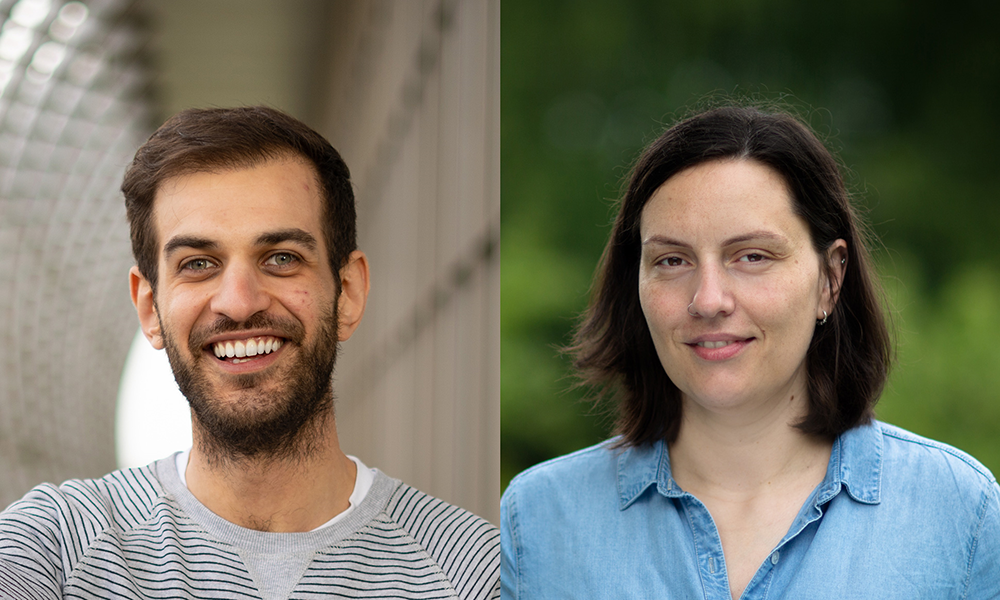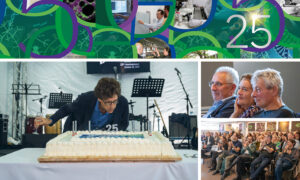
Equality and diversity at EMBL
EMBL's Equality and Diversity Officers strive to ensure that everyone at EMBL feels safe, welcome and supported

EMBL is striving to make its labs and offices a welcoming and inclusive environment for all. To achieve this goal, EMBL’s Equality and Diversity Officers, Luisa Vieites Rodrigues and Zac O’Sullivan, are working closely with leadership and the EMBL community. In this interview, they share their vision and plans.
What is your professional background?
Luisa: During my studies in criminology I developed my passion for women’s rights and feminism. When I finished university, I did two years of research on female delinquency, working on strategies to rehabilitate young women who are in conflict with the law. I then worked at the European Commission in the Organised Crime Unit and the Human Trafficking Response Team. I also worked in the humanitarian sector, first in the Middle East and then in Angola, where I spent two years managing projects related to women’s rights. Now I am based at EMBL in Heidelberg, also covering our sites in Grenoble, Barcelona, Rome and Hamburg.
Zac: I worked as a lab technician at the Francis Crick Institute, then as a lab manager at a biotech company on the Wellcome Genome Campus in the UK, where EMBL’s European Bioinformatics Institute (EMBL-EBI) is located. During that time, I was also co-chair of the LGBTQ+ Network on campus. My position at EMBL-EBI was my first step into equality and diversity as a professional rather than a volunteer.
Why does an organisation like EMBL need Equality and Diversity Officers?
Luisa: EMBL is a large and well-established institution that is striving for excellence. Studies show that a more diverse environment promotes innovation and successful teams. Equality and Diversity Officers ensure that EMBL remains at the forefront of inclusion, making everyone feel welcome and supported. It’s important for EMBL to be mindful of diversity so that we attract excellent scientists and employees from all backgrounds.
Zac: Because our organisation is intergovernmental, we employ people from all over the world. EMBL has its core values of equality and diversity, but our job is to make sure that staff from all backgrounds and cultures are aware of and compliant with EMBL’s values. What’s really important is that our work doesn’t only affect our staff: we teach them how to behave in a diverse environment and they take that knowledge home to their friends and families.
How are you advising and educating people about equality and diversity?
Zac: Luisa and I are part of the EMBL Equality and Diversity Committee, which organises regular meetings with EMBL management to discuss relevant issues. The committee has representatives from every EMBL site to make sure everyone’s voice is heard. At EMBL-EBI, we have an offshoot of the Equality and Diversity Committee, the Equality and Diversity Working Group, which works closely with other organisations on campus to start the right conversations about inclusion and diversity.
We will soon also have a partnership with Stonewall, the largest LGBTQ+ organisation in Europe, to help us integrate diversity and LGBTQ+ inclusion into all parts of the organisation, including policy review, recruitment, and training, while also providing global support to staff.
Luisa: A lot of our work is data driven. We’re in the process of analysing data to understand which demographics are under-represented at EMBL and need more support. The goal is to come up with a long-term strategy to establish objectives, indicators, and activities to promote diversity. We want to use numbers to show our employees that we can be more diverse and inclusive as a community.
One of our upcoming projects is the LEAP mentorship programme for female postdocs. Academia is a leaky pipeline in terms of gender balance: there are more female than male PhD students, but men hold a majority of professorships. The goal is to give female postdocs the support they need to continue their career in academia and get a group leader position.
Are there challenges for equality and diversity that are specific to the scientific community?
Zac: The scientific community is often seen as a very liberal community, free of prejudice. This is not always true: we’re like the rest of the world and we have our own biases about gender, sexual orientation, and race. The most prominent prejudice is what we consciously or subconsciously imagine a scientist to be like. Most people see scientists as straight, middle-aged, white men who have to behave and speak in a specific way to be taken seriously. The problem with that representation is that people who don’t correspond to that stereotype may not feel like they belong in the scientific community, although they could be highly skilled scientists. We want to dismantle that stereotype so that our staff feel included, supported, and advocated for. Science is all about innovation, and this happens best when people from all gender identities and expressions, sexual orientations, ethnicities, socioeconomic backgrounds, and abilities can join in.
Why are equality and diversity particularly important to you?
Luisa: I was born in a very conservative and traditional family and, as I was growing up, I kept seeing and hearing things that didn’t make sense to me. I couldn’t rationalise them, but I knew they weren’t acceptable. As I started studying at university, a new world opened to me and I found my passion for equality and diversity. I really wanted to work for women’s rights because, although I enjoy the privileges of an educated white woman, I still experience discrimination regularly.
Zac: I’ve been in science for 10 years, working in teams that were mainly composed of women. That safe bubble popped when I started looking for other jobs. I am aware of my privileges as an educated man, but I am also a second-generation immigrant with a Muslim background and I faced a lot of discrimination when I was applying to new positions, so much so that I changed my birth name to get invited to interviews. I think I’ve become an advocate for women, LGBTQ+ people, and other minorities in part because of the discrimination I am facing myself. Luisa and I represent different aspects of diversity and our experiences complement each other very well.

What is EMBL doing to celebrate Pride Month?
Luisa: The EMBL LGBTQ+ group, led by Jesús Alvarado and David Puga in Heidelberg, organises regular meet-ups and events to ensure a sense of community, visibility, and support for LGBTQ+ people. This month they’ve organised two online social events with the group to celebrate Pride.
Zac: We were going to fly rainbow and transgender flags on the Wellcome Genome Campus and in Heidelberg for the whole month, but we’ll have to celebrate online instead, because of the pandemic. We’ll run three topical talks by LGBTQ+ people and allies working in science. We produced a Zoom background for staff to show their support during their video calls, and we are running a Twitter campaign throughout the month.
In the wake of the recent protests and other activities in support of the Black Lives Matter movement, how is EMBL working to promote diversity?
Zac: Before the Black Lives Matter movement hit headline news, it was a common misconception that overt racism was the only form we should be wary of. We’re now acknowledging as an institution that racism is a very complex topic and isn’t always overt but actually ingrained into the society we all live in. The Black Lives Matter movement has progressed our discussions because it has put a spotlight on systemic racism. EMBL has a lot of work to do to ensure our workforce is a good representation of the population we serve. We had already begun these discussions in the Equality and Diversity Working Group just before lockdown and we are ready to tackle this head on at EMBL with the support of our leadership.


